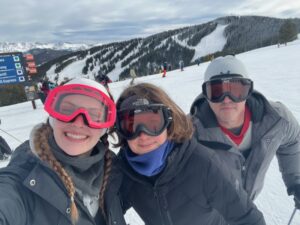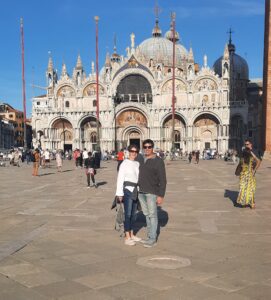1. Where in Iowa are you from?
I am not originally from Iowa. I was born and grew up in Western Nebraska. I moved to Lawrence, Kansas for college, and then moved to Cedar Rapids when I graduated from college to begin my career. At this point, I have lived in the Cedar Rapids area for just over 25 years.
2. Did you go to college? Where did you go, and what did you study?
I did. I went to the University of Kansas and graduated with a BS in Electrical Engineering. As an interesting point, I started college as an architecture major, which is a large reason I picked KU, but switched to engineering after my first semester. I really liked Lawrence and the campus, so I stayed put to finish out my undergraduate years. After a few years of working, I pursued my Master’s, so I also have a MS in Project Management from the University of Wisconsin – Platteville.
3. How did you end up on your current career path? Was this what you’d envisioned you’d be doing with your career when you were younger?
As noted above, I started college as an architecture major. As a young girl, I thought space was cool and considered being an astronaut. I also loved to watch cooking shows, so I contemplated being a chef. Then, I started taking drafting classes in junior high, which I really enjoyed (and I didn’t mind being the only girl in the class), so I kept going with those through high school and that led me to thinking I wanted to be an architect. My dad really really pushed engineering when I was in high school, which was definitely not welcome input at the time. I actually really struggled, and still do, with basic math and algebra / story problems. And to me, engineering = lots and lots of math. So, despite doing very well in high school geometry, trigonometry, and calculus, I had a mind block against engineering. At the very end of my first semester, I was working on a model for my studio class later at night, sliced a piece off my finger and ended up in the emergency room for a few hours waiting for them to bandage it. That shook my desire to keep going on that career journey and after sitting through my first day of my 4 day a week 4 hour studio class the second semester, I declared no more. After some discussions with the school of business and the school of engineering, I switched my classes to take an intro to engineering class and an economics class (as an intro to business). I liked the engineering course, so I revisited my decision on math and picked electrical engineering.
4. Tell us about your experience in startups and entrepreneurship. What have you learned along the way?
My initial introduction to startups was via my role in the corporate world. I would occasionally be asked to participate in the evaluation of one for the purpose of partnering with them, using them as a supplier or buying them. My part in that evaluation was their technical fit for our products or technology needs. Entreprenuersip has always been embedded in my role as an engineer and engineering leader. In that case, under the auspices of a corporation who was seeking innovation from its workforce to maintain and grow its competitiveness. A large part of my role as an engineering leader, particularly in my later years as a Vice President, was to foster innovation in the organization in support of the business. That looks very much like fostering a novel idea and articulating its business and market value to seek funding to further the idea or concept to ultimately take to market. My next foray into startups and entrepreneurship was dinner conversations with my husband who is also in this space, on both sides of the equation. Those dinner conversations sparked my interest in learning more about this space, so when the opportunity to join this committee arose, I pursued it with the desire to learn more about the Private Equity & Venture Capital space.
 5. How do you assess the viability of early-stage startup companies? What do you look for in a good investment opportunity?
5. How do you assess the viability of early-stage startup companies? What do you look for in a good investment opportunity?
In short, real, win, worth (reference https://hbr.org/2007/12/is-it-real-can-we-win-is-it-worth-doing-managing-risk-and-reward-in-an-innovation-portfolio).
Viability to me equates to a product or service that solves a need in the marketspace and adds sufficient value that people are willing to buy it with a business model that ultimately can generate enough profit and value to offset its cost. Assessing that is trickier – it often comes down to how well the team can articulate the market and why their solution adds value in that market, and enough value and competitive advantage to return an investment. There are many cool and novel ideas and solutions out there, but they need to solve a problem that the consumer feels needs to be solved at a price that people are willing to pay – and that’s the bigger challenge, but those are the ideas that are a good investment.
6. Why do you think you are drawn to support entrepreneurs in this way?
I admire these entrepreneurs. They have taken a path that ultimately is a lot of work, with a lot of risk associated with it. It’s not something I am personally comfortable doing, and I admire both their creativity and their appetite to pursue the really tough challenge of driving their idea into a profitable business.
7. Can you tell us a bit about your personal life? Your family, your hobbies, any surprising facts about you that we can share with our readership?
I am married, coming upon our 24th anniversary in a few months, to my high school sweetheart. We have one daughter, who is currently in high school and very active in sports. Hobbies – I like to cook, enjoy gardening and yard work (including managing a multiacre property with timber), and thoroughly enjoy attending her games and events. As a family, we all enjoy traveling; I personally resonate with any place that has a beach!
8. Last one – what advice would you give to your younger self?
This is tough – I generally wouldn’t change the decisions I’ve made over time, including the ones that didn’t turn out so well, as I have learned from them all. Perhaps, the one that sticks out that I wish I had been more open to sooner – don’t be afraid of change, to me personally. Change is an inherent part of being an engineer and managing an organization and I became very comfortable with that as a fact of life, but change is much harder for me to drive in my personal life. It’s easy to get comfortable with something, even when you aren’t that happy. But, when forced to change, the outcome has usually been overall better and left me wondering why I was so hesitant sooner.